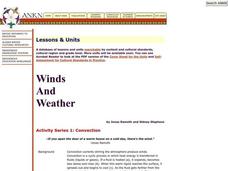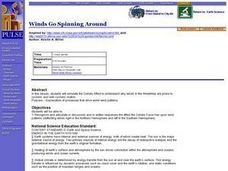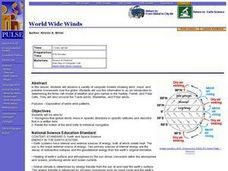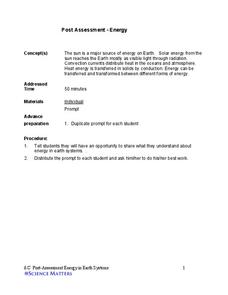Curated OER
Convection and Wind
Learners use water, beakers, hot plates, paper dots, and goggles to participate in a hands on activity where they see how a convection current creates wind. In this convection current lesson plan, students participate in a hands on...
Scholastic
Study Jams! Air Pressure & Wind
Blow your class away with a gust of humor as they watch this video about air pressure and wind. Along the way, they find that the density of air (as determined by temperature, altitude, and water vapor content) leads to air pressure...
K12 Reader
Convection Currents
After reading a brief article on the connection between convection currents and winds, kids use information in the text to respond to a series of comprehension questions.
National Energy Education Development Project
Introduction to Wind Energy
The U.S. produced enough wind energy in 2015 to power all of the homes in Alaska, California, Delaware, the District of Columbia, Hawaii, Idaho, Maine, Montana, Nebraska, New Hampshire, North Dakota, Rhode Island, South Dakota, and...
Science Matters
Energy and Winds
In the study of wind energy, scholars build a small windmill and observe how it transfers wind into mechanical energy. Learners will make connections to the previous lesson with concepts such as the creation of wind...
NOAA
A Laboratory Simulation of Ocean Surface Currents
Stimulate interest in ocean currents with a simulation. The first installment of a five-part middle school series teaches future oceanographers about the forces that interact to cause ocean currents. A simulation shows how wind and...
Bonneville
Let's Build Our Wind and Solar Energy Toy
Who says toys can't be educational? The fourth of five parts in the Solar Updraft Towers unit has scholars create toys that run on solar and wind energy. The devices need to be solar updraft towers that can be placed on a warm surface...
Curated OER
Global Winds
Students extend their understanding of convection to consider global winds and the effect of the earth's rotation on the creation of patterns of prevailing wind direction.
Curated OER
Convection
Students experiment with the cyclic process of convection and apply the principal to everyday events.
Curated OER
Driving Currents
Students conduct a variety of investigations to see how water, heat, and salinity affect the flow of the world's ocean currents,as well as, explore many factors that affect the flow of the world's ocean currents. They also describe in...
Curated OER
Tides and Currents
Students research and describe how currents are formed. In groups, they relate specific terms to the formation of currents and locate different currents on a world map. They also examine tides, how they are formed and how they are...
Curated OER
Winds Go Spinning Around
High schoolers simulate the Coriolis Effect to comprehend why winds in the Westerlies are prone to cyclonic and anti-cyclonic motion. They arrive at an explanation of processes that drive world wind patterns
Curated OER
World Wide Winds
Learners recognize that global winds move in specific directions in specific latitudes and describe that in a written form. They relate the motion of the wind belts to historical navigation.
Rochester Institute of Technology
Heat Transfer
Use an exciting role play activity to teach young chemists about the importance of heat transfer in maintaining homeostasis. They assume the role of a dog sled owner who has been abandoned and must fend for themselves with only a...
Curated OER
Energy
Wow! Colorful and simple, these 160 slides introduce the various forms of energy, along with a relevant image. Some of the images are animations, which help beginning physical scientists to visualize the flow of electrons or energy! This...
Curated OER
Oceanography Worksheet #1
If you are teaching physical oceanography to middle school earth scientists, here is a terrific multiple choice worksheet. Learners look at a diagram of a landscape created by glacial sediment deposition and the resulting ocean floor....
Curated OER
It's Gettin' Hot In Here, So Transfer Energy
Young scholars study the means by which energy is transferred from the sun through the Earth's atmosphere. They examine radiation, conduction, and convection. They complete a lab to determine how the different transfers affect the...
Curated OER
Three Methods of Heat Transfer
Learners participate in a variety of experiments designed to illustrate types of heat transfer including conduction, convection and radiation. They complete worksheets as an assessment of the experiments.
Curated OER
Movement of Air
In this movement of air learning exercise, students identify and describe the purpose for convection and how it effects Earth. Then they describe what thermals are and why they occur in hot and cold air movements. Students also explain...
Curated OER
Current Interactions
High schoolers design an experiment to see how wind, temperature, and salinity work together to influence ocean currents and present it in a report format. They explain to their classmates how experiment findings relate to ocean currents.
Curated OER
Local Weather And Location
Students explain how uneven heating of Earth affects wind and water currents. They describe the limits on current technology in predicting weather and how the Water Cycle is related to local weather.
Curated OER
Thunderstorms and Lightning
Students, in groups, investigate and demonstrate the science behind the development of lightning and thunderstorms.
Curated OER
Is Air a Fluid?
Students discuss the physical properties of fluids and then demonstrate that air carbon dioxide and oxygen) is a fluid by creating currents.
Science Matters
Post-Assessment Energy
After nine lessons and activities about energy, here is the final assessment. The 20-questions include multiple choice, multiple choice with justification, short answer, answer analysis, and labeling diagrams to challenge learners.























